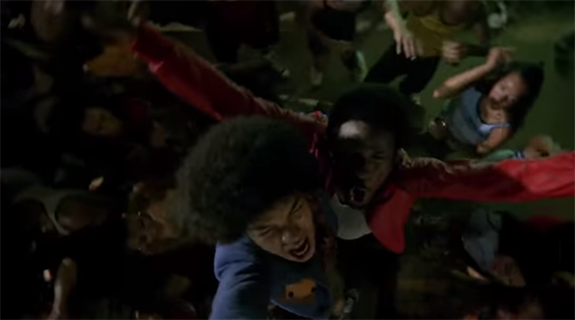In the early 1970s, Grandmaster Flash scoured through record stores in search of the perfect beat.
“The drum solo, that was always too short; that annoyed me,” the recording artist, DJ, pioneer of hip-hop and now associate producer of Netflix’s new series The Get Down—which chronicles the rise of the hip-hop genre in New York City—said during a panel at the Television Critic’s Association Summer Press Tour.
His instruments were a turntable and a mixer, and he came up with a way to manually cut and paste the drum solos together to create musical pieces that drove the hip-hop movement forward.
“I can tell you about the recipe … because I’m one of the bakers,” Flash said.
The Get Down, which premieres Friday, July 29, captures the surge of this new style from the perspective of New York City youth in the thick of it.
“The South Bronx for myself and others … it was like a blank canvas. Disco was the big thing, and we were basically doing our own thing. We had the chance to create something that was joyful to us.”
It’s a story he’s always wanted to share, and now he can thanks to co-creator, executive producer and director Baz Luhrmann.
“When we did this in the ‘70s, we didn’t record it,” Flash said. “So now this particular era can become a topic of discussion. When you have no documentation it’s difficult to explain to people. That Baz wanted to do this is a blessing. Nobody wanted to tell the story.”
At first Luhrmann envisioned a movie.
“But I realized it was too epic; it was too vast,” he said.
One of his main concerns was he didn’t want to do an “outside looking in show.” It had to be from the perspective of the kids in the Bronx who were on the front lines of the new musical movement.
In that regard, the series relies on the multicultural young actors who represent the African Americans, Latinos and Portuguese communities at the center of it all. Some come with plenty of experience. Others, like Tremaine Brown Jr. who plays the character Boo Boo Kipling, producers found rapping on the subway.
Supervising producer Nelson George said the important part is the actors capture the optimism and sense of ambition expressed by young people in the ‘70s who gave rise to the genre. The music reflects the hope shared by a social consciousness at the time, which is also demonstrated in the show’s depiction of the kids’ lives.
“The outside may have been tough, but families were together,” George said. “They were strong, and they raised strong people out of the chaos …. You’re looking at the past but you’re seeing the youth. That’s what elevates the show for me. It highlights the past through the present.”
Indeed, the theme of understanding modern hip-hop by understanding its history is a main concept for creators of the show.
Today, every beat Flash sought in his search through 99-cent record stores is now available in a digital file. From Kanye West to musicians like Drake who are evolving hip-hop with trends like Emo Rap, “it’s mutated about 20 times since Flash started it,” George said.
Flash also spoke to the connection between the past and the present.
“The way hip hop is today, it all ties together, but there is a formula from those years that a lot of hip-hopers don’t know,” he said. “In order to know where you’re going you should know where you came from. We give viewers the chance to see that.”
RELATED:
Netflix Shows Off Its Moves in New Trailer for ‘The Get Down’
South Bronx Teens Are ‘Do or Die’ in Netflix’s Music Drama ‘The Get Down’
Tags:













































__twocolumncontent.jpg)











